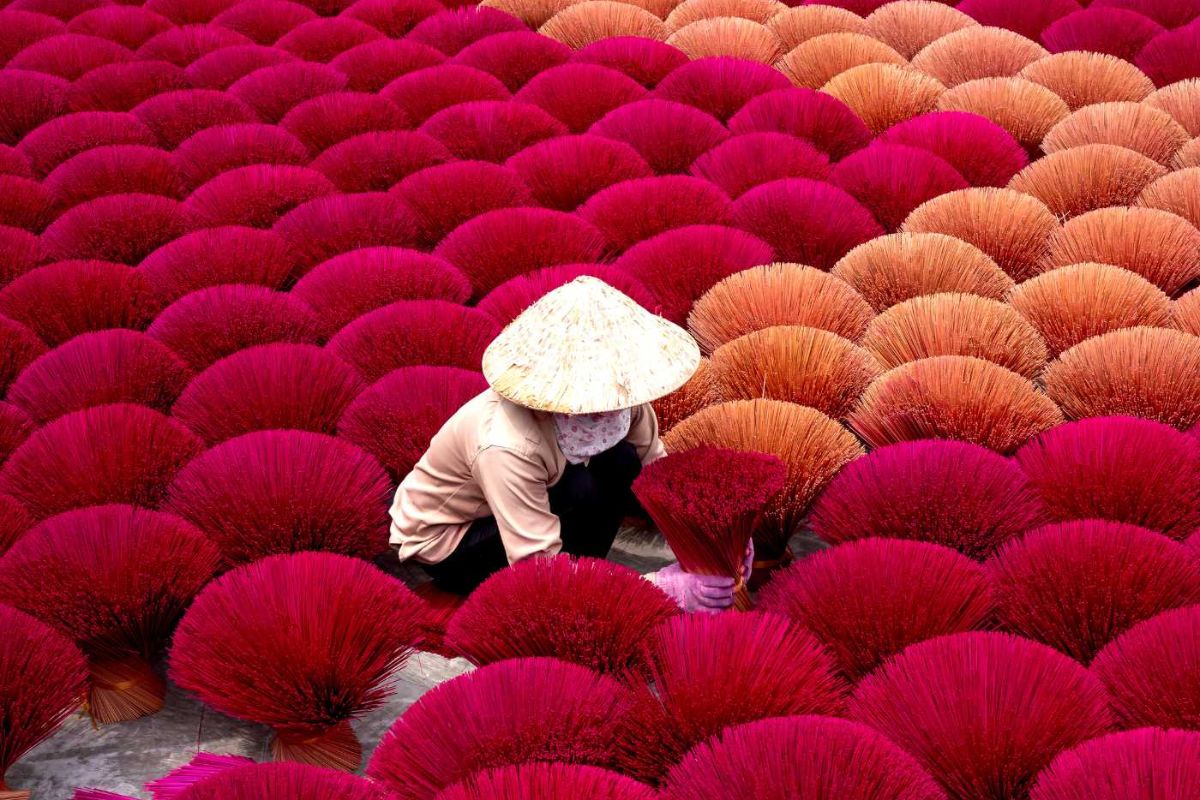TABLE OF CONTENT
As you explore the captivating destination of Vietnam, one aspect of local etiquette to understand is how much to tip in Vietnam tour guide. Tour guides play a crucial role in shaping memorable experiences, and tipping tour guides in Vietnam appropriately is a way to express gratitude for their expertise and dedication. To answer this question, read the article below and make the best decisions for your trip.
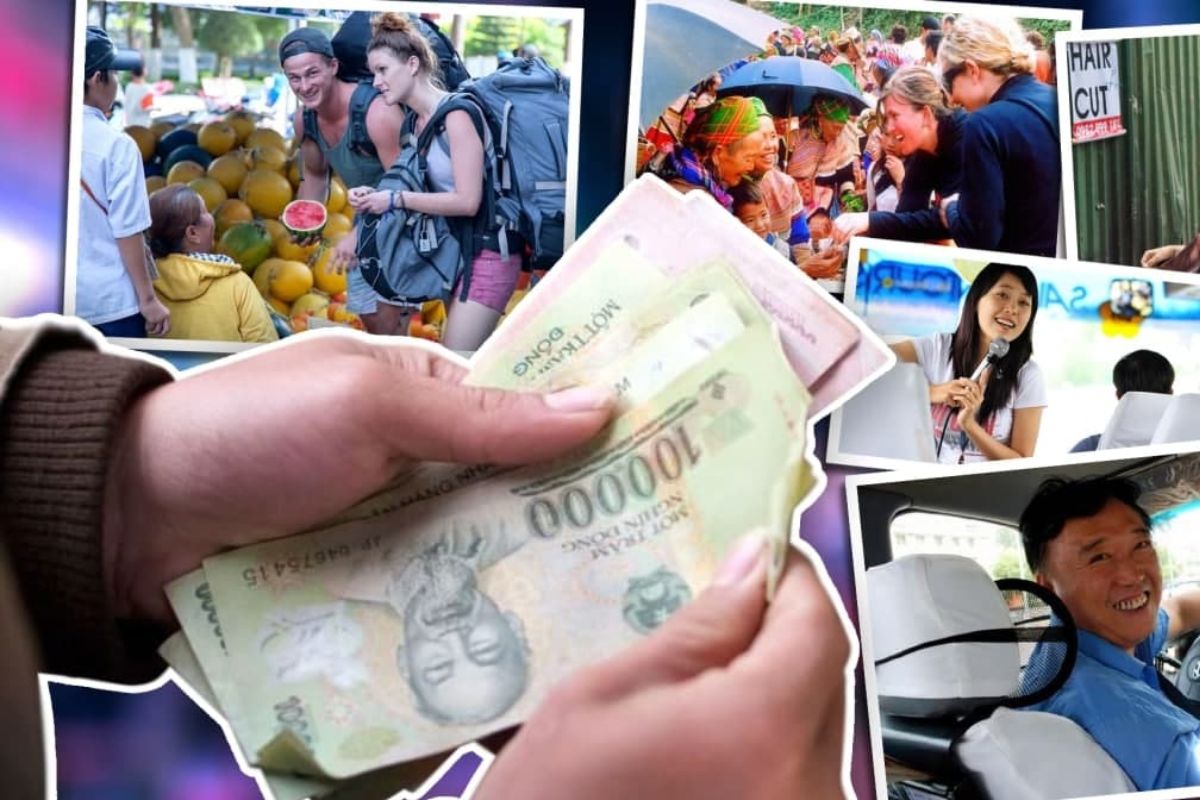
Tippings may vary in Vietnam
About Vietnamese Currency
Before delving into Vietnam tipping guidelines, it’s essential to understand the local currency. The Vietnamese Dong (VND) is the official currency of Vietnam. At the time of writing, the exchange rate is approximately 25,000 VND to 1 USD, though this can fluctuate.
While Vietnam is modernizing, cash transactions remain the norm, especially for tipping purposes. It’s advisable to carry small denominations of VND, such as 10,000, 20,000, and 50,000 notes, as these will come in handy for hassle-free tipping situations. International credit cards are widely accepted at major establishments, but having local currency on hand is crucial for seamless interactions with tour guides and service staff.
Is tipping common in Vietnam?
Traditionally, tipping was not a widespread practice in Vietnam, as gratuities were often included in service charges. However, with the influx of international tourists and the growth of the tourism industry, tipping etiquette has gradually evolved. In major cities and tourist hubs like Hanoi, Ho Chi Minh City, and Hoi An, tipping has become more commonplace, particularly in upscale hotels, restaurants, and service establishments that cater to foreign guests.
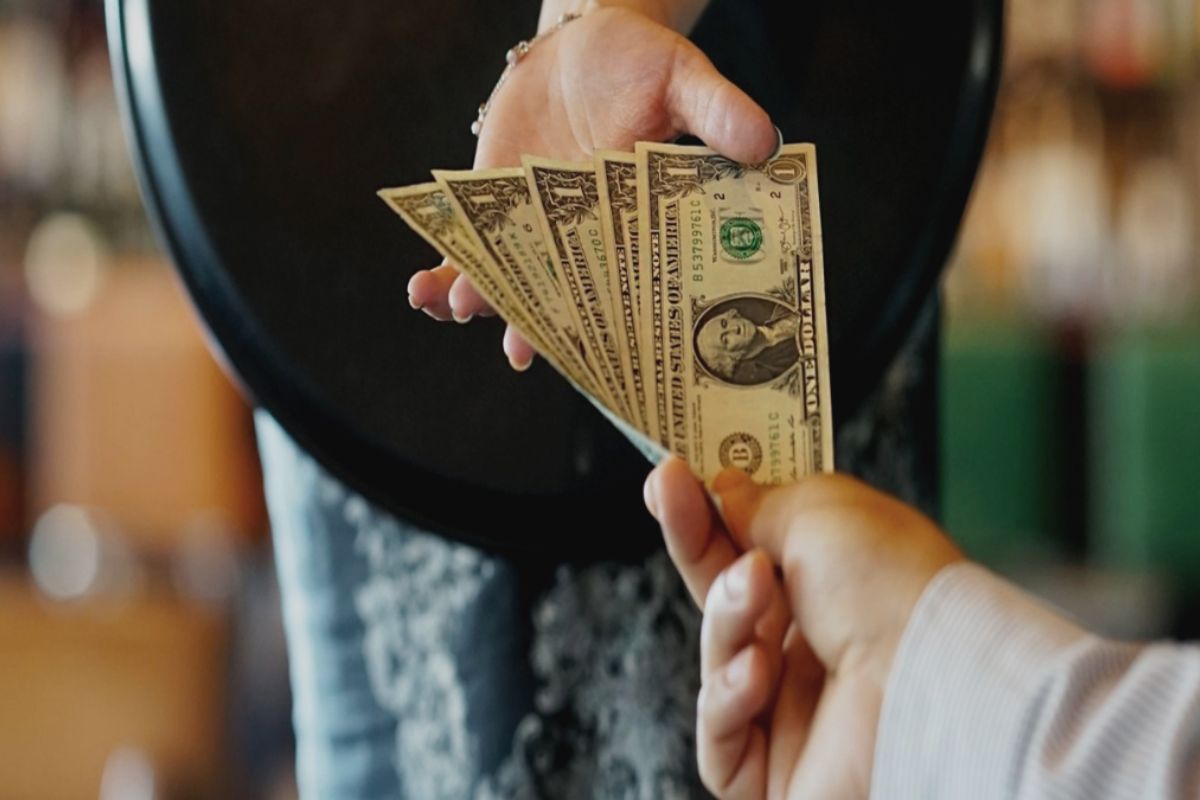
A lot of local services in Vietnam do not require tipping
While tipping is not mandatory or deeply rooted in local customs, it is increasingly appreciated as a gesture of gratitude for exceptional service. Many high-end establishments have started incorporating service charges, typically ranging from 5% to 15%, though these fees may not always reach the frontline staff.
As a visitor to Vietnam, it’s essential to respect local customs while also acknowledging the evolving nature of tipping practices, particularly in areas with significant tourist traffic. A warm smile, a sincere “cảm ơn” (Which mean “thank you” and pronounced like/kɑːm ɜːn/), and treating service staff with kindness and respect can go a long way, with tipping serving as an optional way to show appreciation for truly exceptional service.
>> A-Z guide and things to know about your trip to Vietnam, explore details here!
How much to tip in Vietnam tour guide?
Tour guides play a pivotal role in shaping your Vietnam experience, serving as knowledgeable hosts and cultural ambassadors. Tipping tour guides in Vietnam is a gracious way to express gratitude for their dedication and expertise.
>> Is a tour guide really necessary for your trip? Discover here!
As a general rule, it is customary to tip your tour guide between 50,000 VND to 100,000 VND (approximately $2 – $4 USD) per person per day for a large group tour and 100,000 VND to 200,000 VND (around $5 to $8 USD) per person per day for a private tour. For extended multi-day tours, consider tipping on the higher end of the scale or providing a larger tip at the end of the tour to acknowledge their commitment.
It’s important to note that tipping tour guides in Vietnam is not mandatory, but it is a welcome gesture that recognizes exceptional service. If you are particularly impressed with your tour guide’s knowledge, professionalism, and ability to create a memorable experience, you may choose to tip more generously.
>> Read more: Vietnam Travel Budget-Estimated Expenses in Vietnam Tour
Planning your trip to Vietnam? Check out this special itinerary:
Other Vietnam tipping guide
While Vietnam tipping tour guide is a common practice, it’s helpful to understand tipping etiquette in various other service contexts in Vietnam.
Tipping for taxi drivers
For private transportation like hired drivers or tour guides, tipping is increasingly seen as a thoughtful gesture. A reasonable tip range is 50,000 to 100,000 VND (approximately $2 to $4 USD) per day to acknowledge their professionalism and service. If your driver or guide has exceeded expectations, offering a higher tip can be a meaningful way to express your gratitude for their exceptional service.
In contrast, tipping for regular taxi services is less common. Taxi fares are typically calculated based on the meter reading, and the exact fare is expected. However, if you have had a particularly pleasant experience with a friendly and helpful taxi driver, you may choose to round up the fare or leave a small tip as a token of appreciation.
Tipping at hotels
Tipping has become more accepted in the hospitality industry, particularly for exceptional service at hotels catering to international guests. At hotels, leaving a gratuity is an appreciative gesture when staff members go above and beyond to ensure a comfortable and memorable stay.
If you wish to tip hotel staff, a range of 20,000 to 50,000 VND (approximately $1 to $2 USD) is generally appropriate. For truly outstanding service that exceeds your expectations, you may consider tipping on the higher end of this range.
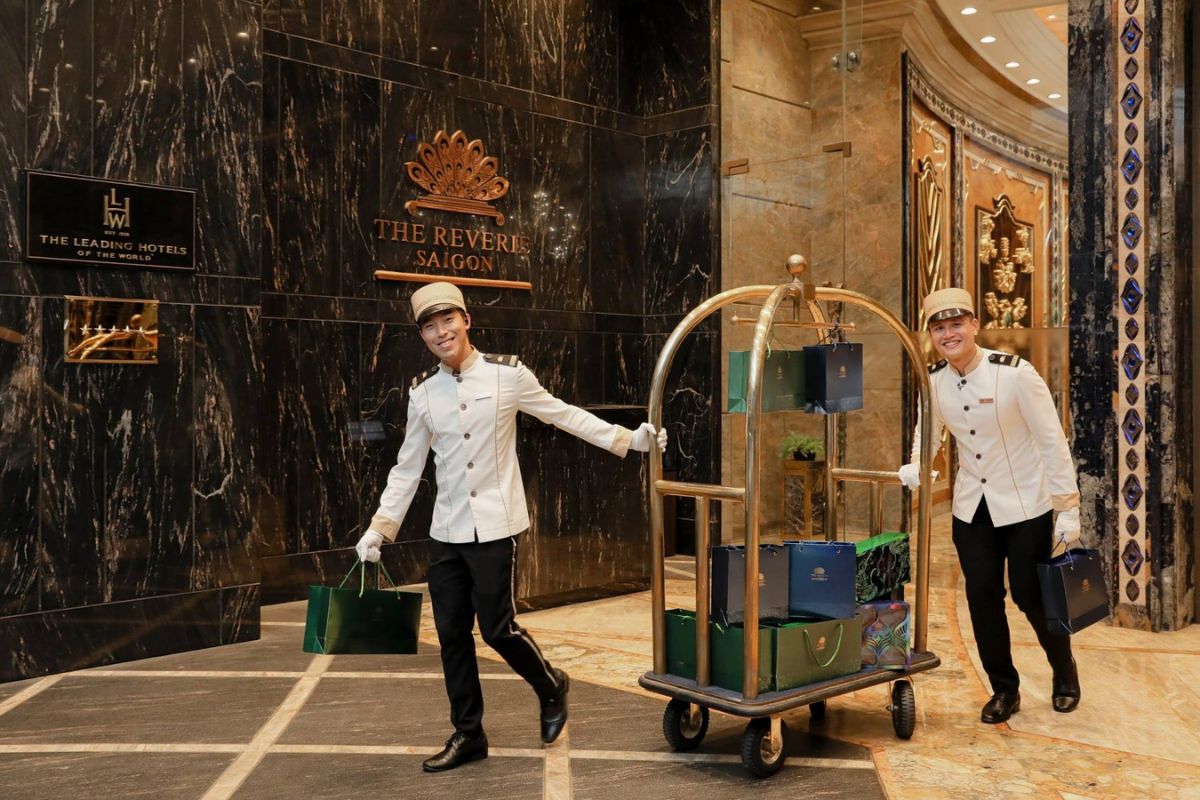
Tipping has become more accepted in the hospitality industry
The method of tipping can vary. You can leave the gratuity in a visible spot in your room upon departure or directly hand it to the specific staff member you wish to acknowledge. The latter approach ensures the tip reaches the intended recipient.
Tipping at restaurants
In most local restaurants and casual eateries, a service charge is typically not included in the bill. In these settings, leaving a tip of 20,000 to 70,000 VND (approximately $1 to $3 USD) is a gracious way to express appreciation for attentive and exceptional service. Some restaurants may have a tipping box or jar at the counter, where you can leave a small gratuity to be shared among the staff.
High-end restaurants and those located within luxury hotels often include a service charge ranging from 5% to 15% on the final bill. It’s worth noting that tipping practices are more established in major cities and tourist hotspots like Ho Chi Minh City, Hanoi, and Hoi An, where international visitors are more prevalent. In these areas, tipping has become a more widely accepted way to acknowledge exceptional service in the dining industry.
Tipping at bars
Bars and nightlife establishments in Vietnam occupy a distinct space within the service industry, often catering to a more upscale clientele and commanding higher prices compared to casual dining options. However, despite the perceived exclusivity, bartenders in Vietnam typically earn modest salaries and rely heavily on gratuities to supplement their income. Tipping bartenders has become a well-established practice in Vietnamese bar culture. While the amount can vary based on the level of service received, a gratuity of around 50,000 VND (approximately $2 USD) is generally considered an appropriate and expected tip for attentive and friendly service.
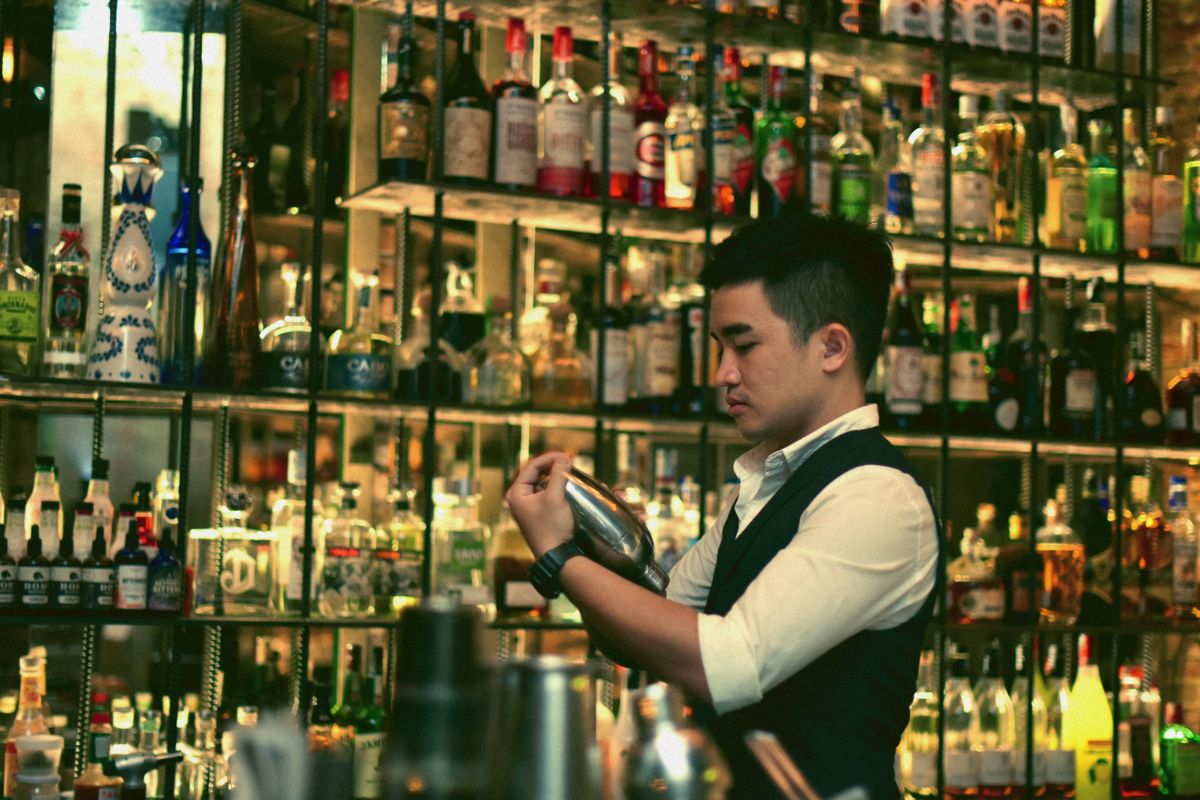
Tipping bartenders has become a well-established practice in Vietnamese bar culture
Tipping at spa
Tipping at spas is generally viewed as a thoughtful gesture to acknowledge exceptional service and the efforts of the staff. At upscale, high-end spas, a service charge or commission for the staff is often included in the overall cost, which can be relatively steep. In such cases, an additional tip may not be expected, as the pricing already accounts for the staff’s compensation.
However, at more modest spa facilities and massage parlors, where prices are comparatively lower, leaving a gratuity is commonly appreciated. A tip of 15-20% of the total bill, or around 50,000 to 100,000 VND (approximately $2 to $4 USD), is a thoughtful way to express gratitude for attentive and skilled service.
FAQs
Is tipping tour guides in Vietnam mandatory?
No, tipping tour guides in Vietnam is not mandatory in Vietnam, but it is appreciated for good service, especially for tour guides, drivers, and service staff in upscale establishments.
How much to tip in Vietnam tour guide?
It is customary to tip your tour guide between 50,000 VND to 100,000 VND (approximately $2 – $4 USD) per person, per day. For extended multi-day tours, consider tipping on the higher end of the scale or providing a larger tip at the end of the tour.
Should I tip in cash or add it to the bill?
In Vietnam, it is generally recommended to tip in cash, as tipping is not always included in the bill, and service staff may not receive tips added to the bill.
Should I tip in Vietnamese Dong or US Dollars?
It is preferable to tip in Vietnamese Dong, as it is the local currency. Tipping in US Dollars may be accepted in some instances, but it can be inconvenient for the recipient to exchange the currency.
In conclusion, by following these tipping guidelines, you can navigate Vietnam’s service culture with confidence, showing appreciation for excellent service while respecting local customs. Remember, a warm smile and a sincere “cảm ơn” (thank you) can go a long way in fostering positive interactions during your Vietnamese adventure.
–
For those seeking to explore the rich tapestry of Vietnam and other captivating destinations in Southeast Asia, Asia Encounter offers a curated selection of immersive tours led by experienced and passionate local guides. Their Vietnam tours, along with itineraries in countries like Cambodia, Laos, and Thailand, provide an authentic and in-depth look at the region’s diverse cultures, landscapes, and traditions.



